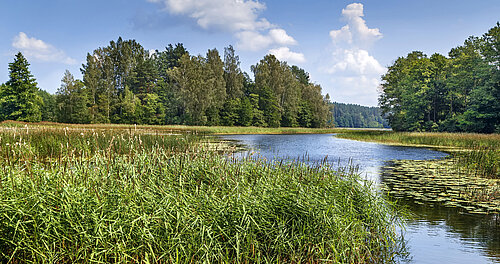The Centre of Competence for Nature-based Climate Action (KNK) coordinates advice on the topic of nature-based climate action at German federal level on behalf of the Federal Agency for Nature Conservation (BfN).The KNK offers information about available funding, provides subject-specific information, and hosts networking events for stakeholders and interested parties.
The Centre of Competence forms part of the German Federal Action Plan on Nature-based Solutions for Climate and Biodiversity (ANK) from the Federal Ministry for the Environment, Climate Action, Nature Conservation and Nuclear Safety (BMUKN).The Action Plan aims to achieve significant improvements to the general state of ecosystems in Germany, so as to strengthen their resilience and climate change mitigation performance. The ANK does this by using synergies between climate change mitigation and nature conservancy to help counter the climate crisis, preserve and improve biological diversity, and take steps to minimize the impacts of climate change. In this way, the Action Plan is making a key contribution to achieving the climate action goals set out in the Federal Climate Change Act for the sectors of land use, land-use change and forests (LULUCF).
As part of the ANK, the Federal Environment Ministry has established a series of funding programmes. The Centre of Competence advises potential applicants about these programmes.
What is nature-based climate action?
Nature-based climate action aims to use nature-based solutions to limit anthropogenic climate change. The objective is to maintain and restore the functional capability of ecosystems so that they produce fewer greenhouse gas emissions, and can absorb and store greater volumes of carbon into the long term. These nature-based solutions include measures to protect and restore or ensure sustainable usage. Tailored to local conditions, they can be implemented in both natural habitats and areas already supporting human settlements. This works to create synergies between climate action and biodiversity conservation, adaptation to climate change and human well-being.
Examples of measures used in nature-based climate action include transforming forestry monocultures into near-natural forests as well as rewetting peatlands.
Rolling-out nature-based solutions at scale
The ANK can only work at scale if local stakeholders are informed about suitable funding programmes. Providing knowledge about the objectives, options and special aspects of nature-based climate action is a key requirement for the effective implementation of the corresponding measures. Local projects are improved by networking and the sharing of experience between those working in conservation and climate change mitigation. These are the points of focus for the Centre of Competence for Nature-based Climate Action.
Bringing together and supporting actors
The Centre of Competence is setting up supporting structures intended to support the practical implementation of the ANK at local level. The KNK is ensuring the participation of established institutions and partners in this work. The aim is to bring on board the many associations, organisations and scientific establishments already working on nature-based solutions for climate. This provides an improved level of support for newcomers to nature-based solution projects – such as local authorities, land owners, agricultural operators and forestry operators – from the selection and development of suitable nature-based climate measures through to their implementation.
Services provided by the Centre of Competence for Nature-based Climate Action:
- Nationwide point of contact for the topic of nature-based solutions for climate and biodiversity
- Support and advice for funding applicants
- Organisation of specialised and information events
- Networking of actors in the regions and locally
The Centre of Competence for Nature-based Climate Action is a division of Zukunft – Umwelt – Gesellschaft (ZUG) gGmbH.
How does nature-based climate action work?
Intact ecosystems provide natural protection from the impacts of climate change. Forests and wetlands, soils and peatlands, oceans and bodies of water, and near-natural urban and rural green spaces absorb atmospheric carbon dioxide and store it over the long term. Nature-based climate action comprises measures that conserve, strengthen and restore these kinds of natural ecosystems. Their service as climate protectors is maintained and developed while conserving biodiversity.
